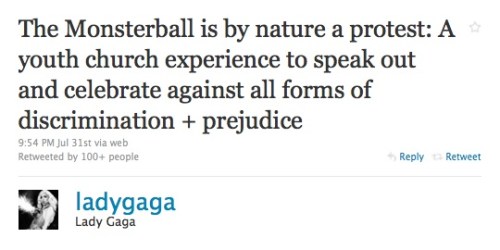LADY GAGA IN ARIZONA:
At the Monster Ball in Arizona this weekend, Lady Gaga answered the dissatisfied murmurings about her continuing her tour through Arizona when so many musical artists are boycotting the racist SB-1070. (@joemygod)

If you’ve ever been lucky enough to attend the Monster Ball, you know that in between the dancing and the architectural demon keytars and the seventeen-inch platform heels, there’s a healthy dose of radicalism – in this case, Gaga performed with STOP SB-1070 written on her forearm, and gave the following speech to her fans:
It’s an interesting question, and a more nuanced one than we usually expect from pop stars: how do we affect change in policies that we don’t like? Do we withdraw our support, or make noise about them? Or are those approaches mutually exclusive? Can you make change with your work, or do you have to make change by threatening to withhold it? Is SB-1070 the monster that ate our hearts and brains?
The marriage of live music and political activism has been a long and storied one – that is the point of art after all, to comment on the world we live in and inspire change, and where better to do that than in the concert setting when you’ve got your whole community in one place?
Contemporary pop music concerts don’t necessarily have the same strong association with changing the world, though – the concert boycott that many musicians imposed after the introduction of SB-1070 was pretty much as good as it got, besides like Live 8 or Farm Aid. “Pop” music by nature is supposed to be popular and appeal to all different groups of people regardless of political affiliation. Taylor Swift won’t even tell the media who she voted for in the 2008 election (though we can probably guess who).
Let’s take Gaga’s point and run with it for a moment, though – what if music itself, and the way that you made and performed it and listened to it, could be a protest that worked towards social change? Not just in the form of benefits – not in the sense that art is a product that can be sold for a good cause or removed from the market in order to make a statement, but that the experience of it, in and of itself, can be a force for change. Could that be a thing that happens in the real world? Lady Gaga apparently thinks so, but she also thinks that lobster claws are shoes sometimes.
I mean, obviously music does have power, and it does change things – Bob Dylan’s lyric “you don’t need a weatherman/to tell which way the wind is blowing” was the inspiration for the violent activist/domestic terrorist group The Weathermen; strong female artists from Salt n Pepa to Dolly Parton have changed hearts and minds with their lives as well as their art; rappers like Talib Kweli and Common and Mos Def make hip hop that comments on poverty and racism and politics; obviously the Indigo Girls and Ani Difranco helped turn you into a politically-active feelings-having-flannel-wearing lesbo, and the list goes on and on. And it’s important on a personal level, a level that’s hard to explain in concrete terms – it’s about sharing something, it’s about crying during the encore and looking up to see that you’re not the only one, it’s about how you’re never the same after that moment of connection as you were before it.
The Monster Ball is definitely an example of this – when our own Intern Elizabeth went to the Chicago Monsterball last year, she wrote that “I’m not usually into dance music. I’m not even into dancing. But being in that room in that energy and knowing that I wasn’t the only one there attending her first big stadium show — I actually felt like dancing. I know that it seems exaggerated or cliché that I say Lady Gaga and The Monster Ball changed me, but it did.” Is it crazy or wrong to argue that music and musical artists can be meaningful, can do things that matter, that the art they produce makes a difference? No, definitely not.
On the other hand, though, tickets to the Monsterball are roughly $200 at their cheapest, and while Lady Gaga did dedicate that night’s performance of “You and I” to a boy whose brother had been deported by SB-1070, it’s unlikely that that same boy could normally have afforded to see her show. Lady Gaga likes to tell Monsterball attendees that she’s locked the doors to the stadium to “keep all the freaks outside”; while we understand that sentiment better than anyone, it makes us wonder whether anyone outside the concert had even considered whether it might be a protest of anything besides having to wear pants instead of bronze leotards. Which brings us to the question: how much does this have to mean, and to whom, before it, uh, means anything?
It’s refreshing that Gaga acknowledged that “dumb fucking pop stars” aren’t going to “collapse the economy of Arizona,” but can a large-scale, corporate-sponsored, expensive, mainstream pop concert be considered a “protest”? She could have pointed out that refusing to play doesn’t hurt the politicians who made this law, it only hurts the fans, and the people working on her tour, and the local businesses, which would have been a valid argument on its own – did she need to couch her reasons for being there in some form of political act? And do you buy it? She did say that the real work in protesting this law needs to happen on the ground – how much do you think can happen on the stage?
Thoughts? Feelings? Feelings set to music? Was anyone at the Arizona Monster Ball? Share with us!
(In actual news about SB-1070, a district court judge has blocked many aspects of the law, making it slightly less horrible and reprehensible but still mostly awful.) (@huffpo)






